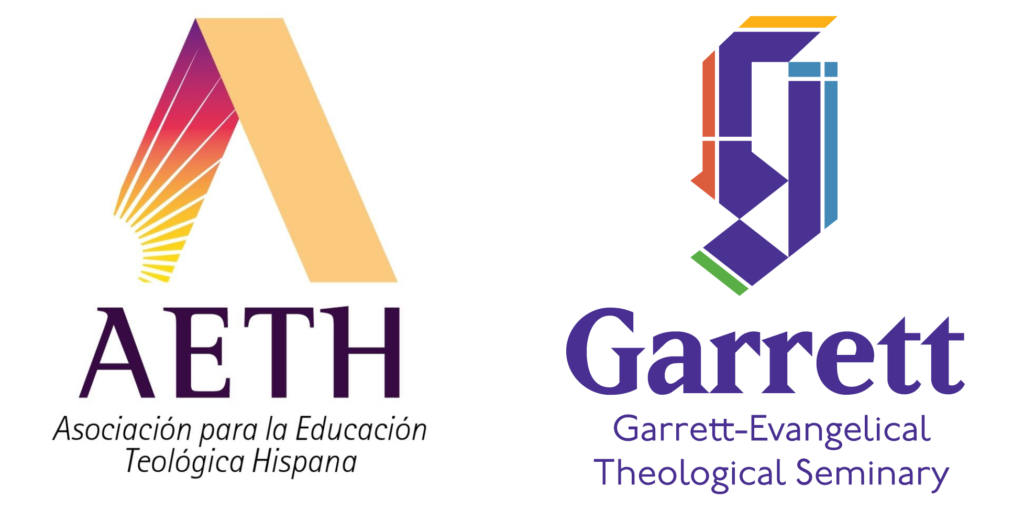AETH & Garrett Seminary Partner To Empower Latiné Theological Education in the U.S.
April 23, 2024

In the U.S. and global Church, Latiné contributions are often overlooked, underfunded, or outright opposed. This not only robs well-deserved resources from Latiné communities—it impoverishes the Church as a whole and inhibits full understanding of how God moves through the world. A growing partnership is trying to change that.
“We want Garrett-Evangelical to reflect more fully Chicagoland, and the church we inhabit,” says President Javier Viera. “With the sizable Latiné community in Chicago, we need to be responsive in ways that historically the school has not been.” This year, Garrett has helped grow the formal partnership with AETH (Asociación para la Educación Teológica Hispana, or in English, the Association for Hispanic Theological Education) to support AETH’s work expanding theological education for Latiné leaders in the U.S., through non-traditional degrees, research, mentorship, and bilingual conferences.
When I speak with her, AETH Executive Director Jessica Lugo speaks animatedly about the partnership from her home in San Juan, Puerto Rico. She’s impressed that the teams at both institutions are so committed to collaboration, not to advance their own organizations, but to promote Latiné leadership.
“That’s why I say the Church with a capital C. I’m not talking about the building and the congregation,” Lugo said. “I’m talking about the Church as the Body of Christ in all its representations. There’s people out there doing church in new, progressive ways that we probably don’t even think about yet.”
“In the Latin American and Latiné reality, there’s not many people going into full-time ministry, said Wendy Cordero Rugama, a first year seminarian at Garrett Seminary, originally from Costa Rica. “It’s important, finding avenues for people who have whole other careers to still get the resources they need to be pastors.”
AETH certifies Bible Institutes, often called Institutos in a Spanish-speaking context. Institutos help folks become church leaders without an onerous four-year degree followed by three years in seminary. By partnering with an accredited seminary like Garrett, there are more pathways for students to enter grad level programs without a bachelor’s degree. To remain accredited, Garrett Seminary must require bachelor’s degrees from most seminarians. But agreements like this allow the seminary to serve more students, and ensure church leaders can gain the education and recognition they deserve.
“It’s part of democratizing knowledge and resources—exactly the kind of thing I would expect Garrett to support,” Rugama says.
The partnership also lets Garrett serve as a fiscal sponsor for new programmatic funds. This year along, AETH and Garrett were awarded over $4.5 million in grants for Hispanic ministry from the Lilly Endowment.
Those funds support capacity building and staff at AETH and Garrett, including work to grow the 30-year-old Hispanic-Latiné Center on campus. There’s also subgrants to support certified Bible Institutes—funds that AETH can re-grant to support faculty and students at Institutos.
All staff interviewed for this article shared a vision of broader commitment to support Latiné students and leaders, both in the U.S. and globally. Garrett Seminary is on track to establish another global hub location in Chile in partnership with the local church. And the Garrett Collective, a new initiative for distributed learning, will include curriculum in Spanish and English attuned to the needs of Latiné communities.
Where do students like Cordero Rugama hope the partnership will lead?
“One of the big issues that AETH cares about is the US-born generation of Latiné people who are leaving Latiné churches. What does ministry for the next generation look like?” she asks. “Unless we address specifically the Queer Latiné community, we’re going to continue to struggle with people in my generation and older who don’t feel comfortable in church spaces.”
Wherever the partnership heads, one thing is certain: The journey will be walked together.
“It’s not like we’re taking what we’ve got and translating it. We’re in a relationship, asking what the community needs, and then we will offer that content together,” said President Viera. “That to me is how you decolonize not only our degree program curriculum, but all we offer.”
Viera described this initiative as a hopeful sign for the seminary. “It’s part of Garrett-Evangelical’s larger commitment to globalizing education and our partnerships, it’s the first of what will be more to come.”

